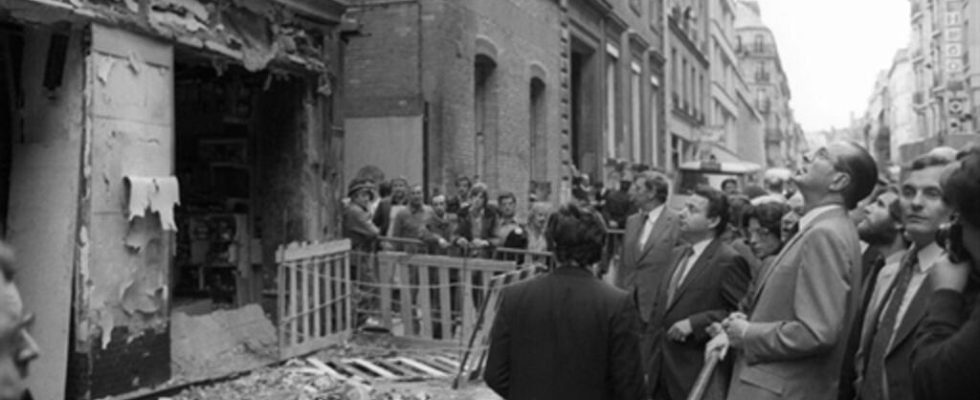On October 3, 1980, a bomb attack on the synagogue on rue Copernic in Paris killed four people and injured dozens. The trial opens this Monday, April 3, but without the only accused, Hassan Diab.
Barring a huge surprise, Hassan Diab should not appear at the opening of the hearing on Monday. The special Assize Court of Paris, competent in terrorism matters, should therefore judge him by default. The 69-year-old Lebanese-Canadian academic had indicated his choice to the president of the court during a preliminary examination. ” He has no reason to change his position “, declared to AFP one of his lawyers, Me William Bourdon.
This absence encourages Patricia Barbé, a civil party in this trial, to approach it with ” caution “. ” I don’t know what dimension it can take in terms of the trial, but it’s quite surreal “, she confides at the microphone of Laura Martel, from the RFI France service. Patricia Barbé was 16 years old on October 3, 1980, when her father, a master driver, was killed by the explosion of the bomb while he was waiting in front of the synagogue on rue Copernic, in the 16th arrondissement of Paris.
That Friday, Shabbat evening, 320 faithful were gathered at the headquarters of the Union liberale israélite de France when ten kilos of pentrite placed on a motorcycle parked outside exploded. The canopy above the rabbi collapses. Residents see their armored door blown. A couple and their children find themselves propelled from the first floor onto the public road. In the street, a vision of the apocalypse: flames, cars on fire, others overturned, dead bodies, bloody or under the rubble. Result: four dead and forty injured.
An attack attributed to a dissident group of the PFLP
The day after this first attack targeting the Jewish community since the Liberation, thousands of people gathered spontaneously in front of the synagogue. In the procession of demonstrators reaching the Champs-Élysées, the Prime Minister’s statements the day before fueled anger. Raymond Barre had said his “ indignation ” in front of ” this heinous attack which wanted to strike Jews who were going to the synagogue, and which struck innocent French people who were crossing rue Copernic “.
The police first dig the trail of the extreme right. Without success. Never claimed, the attack is finally attributed to the Popular Front for the Liberation of Palestine-Special Operations (FPLP-OS), a dissident group of the PFLP. The years pass, governments follow one another, and the file seems to be stalled. ” We are facing a slowness of justice to settle this case which is totally surreal, criticizes Patricia Barbé, punctuating her reflection with a nervous chuckle. For about thirty years, we remained in silence, and then for a dozen years, we are again immersed in this file. »
In 1999, Hassan Diab was identified by intelligence as the one who made and planted the bomb. He was extradited and imprisoned in France in 2014 after a long process. He leaves, free, in Canada in January 2018 after having benefited from a dismissal. The investigating judges considering, against the opinion of the public prosecutor’s office which had appealed, that the charges brought against him were not ” sufficiently convincing “. His return to the assizes is finally ordered three years later.
Hassan Diab, who will be tried for murder, attempted murder and aggravated destruction in connection with a terrorist enterprise, faces life imprisonment. The sociology professor, who assures us that he was then taking his exams at the University of Beirut, ” protests since the first minute of his innocence “. He ” trusts his lawyers and we will make a strong case that this man cannot and should not be convicted. “, insists Me Bourdon.
In the meanders of geopolitics and a sprawling procedure
For three weeks, the special assize court will plunge back into the intricacies of geopolitics and legal proceedings which required international letters rogatory in some twenty countries. The prosecution points to the resemblance of the former Beirut student to composite portraits made at the time, the testimony of a couple claiming that he belonged to Palestinian groups in the early 1980s, as well as comparisons between Hassan Diab’s handwriting and that of a hotel form filled out by the man who bought the motorcycle. These handwriting expertises were fiercely debated during the investigation and should be discussed again during the trial.
► Read also : Attack on rue Copernic: the maze of a long investigation (article from 2008)
The central piece of the file remains the seizure in Rome in 1981 of a passport in the name of Hassan Diab, with entry and exit stamps from Spain, the country from which the commando would have left, on dates consistent with the attack. ” He was in Lebanon at the time of the events, we establish him », retorts William Bourdon. Former university students and the ex-wife of Hassan Diab had corroborated his statements, recalls his defense. The two investigating judges who had signed the dismissal order, and who are summoned to appear, had judged “ plausible that the accused was in Beirut in October 1980.
In requesting the dismissal of the Lebanese-Canadian, the public prosecutor had estimated that the “ doubts about his presence in Paris during the attack deserved to be examined by an assize court. “ What is at stake in the trial is acquittal or perpetuity, it’s quits or double “, remarks Me Bourdon. Patricia Barbé, she simply hopes that justice will go to the end of the case in order to be able to “ turn the page “. ” We are obviously not in the same state of mind as 43 years ago, because we had to move forward, make our life, but we hope for an outcome, whatever it is. The verdict is expected on April 21.
(And with AFP)
